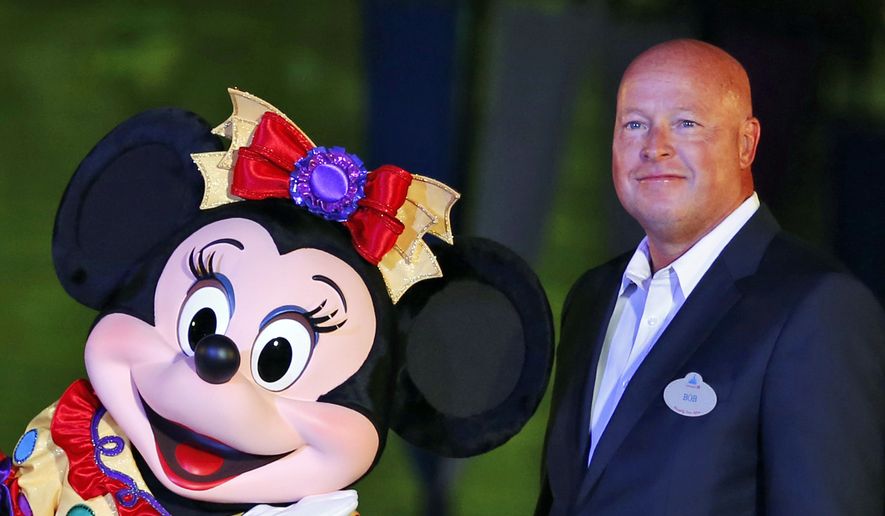OPINION:
“They brought this on themselves.”
That’s how Florida Gov. Ron DeSantis views the Walt Disney Co.’s precarious predicament, as public confidence in the entertainment giant has waned and at least two recent films have sputtered at the box office.
Much of the turmoil, critics say, is rooted in Disney’s higgledy-piggledy decision to become the centerpiece of the contemporary culture wars.
Disney, once the most trusted children’s brand in the world, is undoubtedly still an entertainment powerhouse, though recent political and cultural decisions — and leaked videos showing staff discussing intentions to increase LGBTQ content — have eroded faith in the brand. And that has led to some complex feelings about Disney’s current and future endeavors.
As I’ve reported, Hart Research Associates found earlier this year that just 33% of Americans have a “very” or “somewhat” positive view of Disney, down from a 77% favorability rate found last year in a separate poll conducted by Public Opinion Strategies.
Such startling downward trajectories would rock even the most confident of companies. And while Disney hasn’t outright admitted the impact of its political meanderings, the decision to abruptly fire CEO Bob Chapek and replace him with former CEO Bob Iger speaks to the overarching internal discontent and disenchantment.
Just days after that notable shakeup, Disney’s latest theatrical release, “Strange World” — widely heralded as the company’s first inclusion of a gay teen romance — flopped at the box office. The movie is estimated to lose $100 million potentially, leading some to conclude Disney is now seeing a large-scale reaction to its content evolution.
The saying “go woke, go broke” is certainly overused in the modern vernacular. And in the case of Disney, there could be some truth to the mantra, though the movie-making behemoth isn’t going anywhere anytime soon.
Still, a $100 million loss on a movie is deeply concerning, especially after “Lightyear,” a film based on Buzz Lightyear, a protagonist in the “Toy Story” universe, also had a relatively benign theatrical showing after it was revealed the film would include a same-sex kiss.
Plus, Disney’s complex situation devolved earlier this year when Mr. Chapek initially declined to wade into the debate over Florida’s Parental Rights in Education Act, a law banning public school teachings about sexual orientation and gender identity in kindergarten through third grade.
Critics called the legislation the “Don’t Say Gay” bill despite the word “gay” never appearing in the text. Mr. Chapek smartly warned that “corporate statements do very little to change outcomes or minds,” but he and Disney were seemingly pressured into doing an about-face.
That resulted in an epic battle between Disney and Mr. DeSantis over the legislation, with Disney going from silence to suddenly pledging to see the legislation overturned.
Once again, the reaction among many in the public was negative, with confusion and frustration over Disney’s sudden activism. All of this sparked an amalgam of chaos, consternation and, ultimately, a sullied brand.
Make no mistake: Companies are free to take political and social standings, though they must live with the result of those decisions. In this case, Disney’s approach, from an outsider’s point of view, seems anything but favorable.
And that brings us back to Mr. DeSantis’ belief that Disney only has itself to blame — a reality that’s almost impossible to dismiss. The governor spoke this week about his feud with Disney after Mr. Iger — fresh back in his role as CEO — said during a company town hall he’s sorry to see Disney “dragged” into the culture wars.
“I was sorry to see us dragged into that battle. And I have no idea exactly what its ramifications are in terms of the business itself,” Mr. Iger said. “What I can say is, the state of Florida has been important to us for a long time, and we have been very important to the state of Florida.”
The Disney head honcho purportedly added that he wants to be inclusive while quieting down the political chaos — a comment that could mean Disney realizes its antics have gone too far.
Mr. DeSantis, though, had little sympathy for Disney’s debacle, suggesting during a Fox News appearance that Disney didn’t get “dragged” into the debacle. Rather, he said the company “went in on their own” with its activism and intention to dismantle legislation, which became law.
Regardless of what unfolds next, one thing is clear: Mr. Iger has a massive task before him to manage consternation and interests, retain the audience, heal Disney’s self-inflicted wounds, and rebuild a multigenerational trust that has been broken.
• Billy Hallowell is a digital TV host and interviewer for Faithwire and CBN News and the co-host of CBN’s “Quick Start Podcast.” Hallowell has written four books, including “Playing with Fire: A Modern Investigation into Demons, Exorcism, and Ghosts,” and “The Armageddon Code: One Journalist’s Quest for End-Times Answers.” He was formerly the director of content and communications at Pure Flix and the former faith and culture editor at TheBlaze.




Please read our comment policy before commenting.